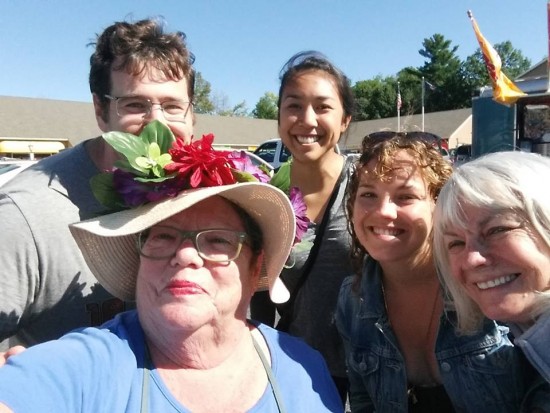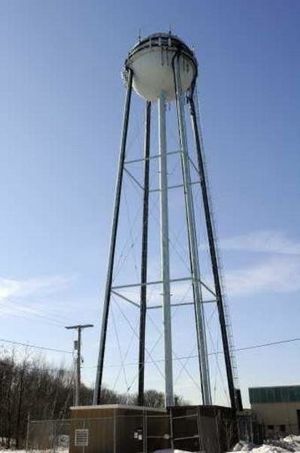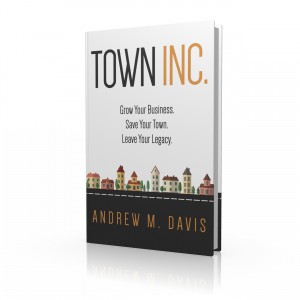Before reading Andrew Davis’ book, Town Inc., I hadn’t given much thought to why I live in Plaistow, New Hampshire. In fact, I hadn’t given much thought to my town at all.
When I tell people I’m from Plaistow, in response to their question of where I’m from, I usually have to follow it up with a qualifier: “I’m right over the border from Haverhill, Massachusetts, about an hour north of Boston.” Ah!
According to Davis, this type of geographical qualifier is a typical response.
For most people who live in Haverhill and other surrounding Massachusetts border towns, Plaistow is the place you visit for tax-free shopping, including alcohol. (NH is a sales tax-free, and income tax-free, state.) On weekends, it can be difficult to get in and out of town as the main road, NH Route 125, which runs north and south, is clogged with people in vehicles making their way to the Market Basket and state liquor store.
For these weekend shoppers, it can easily appear that Plaistow is comprised of chain stores and fast food restaurants located on a busy state road, but this isn’t the case. Take a few easy turns and you’re into what I refer to as the “real” Plaistow, the quaint village I’ve come to love.
Town Inc. — A “rallying cry” for small towns
Three years prior to writing Town Inc., Davis set out to understand why some American towns are booming while others are bust. His journeys, which had him criss-crossing the U.S., revealed an entirely different idea than the one he started with, namely:
The difference between prosperity and economic struggle comes down to one simple thing: a visionary leader or leaders relentlessly fosters an audacious claim.
This audacious claim is simple but profound. The booming towns stake their claim as a “capital of the world.”
You already know of some “capitals of the world.” Hollywood, for example, is the entertainment capital of the world.
By making the audacious claim, a town then sets up location-envy, which Davis defines as the “emotional belief that one’s success is defined by the location of one’s work.” Location-envy is what gets people to relocate.
If you want to work in the movie industry, then you’re going to move Hollywood. I had a colleague who did just this a few years ago. Her daughter is an aspiring actress and in order to increase her opportunities, they moved from Massachusetts to Los Angeles.
Town Inc. is filled with stories about entrepreneurial leaders across the U.S. who have defined the very places in which they do business.
Warsaw, Indiana, for example, has staked its claim as the Orthopedic Capital of the World ™. Why Warsaw, Indiana? Well, the town, comprised of only 13,000 people and no international airport, is world-headquarters for three of the five largest orthopedic manufacturing companies in the world.
The global orthopedic market, Davis writes, is worth $38 billion — “and one-third of that is based in Warsaw. Orthopedic-related businesses account for $11 billion in annual revenue for the unassuming little town.”
When I first read the book, I could hear the inner critic in my head telling me that while Davis’ ideas are thought-provoking — indeed, ground-breaking — there was no way in hell that I, a marketing consultant who works from home in Plaistow, NH, could ever become a “visionary” of the magnitude outlined in the book.
But while into my second reading, I learned about Jane Lang.
Jane Lang is a wonderfully vibrant older woman — one you’d be quick to assume isn’t a visionary. She doesn’t head up a multi-million dollar corporation. She’s not jetting off anywhere. Nope.
I knew Lang from my weekly visits to the Salem NH Farmers Market, held every Sunday from 10:00 AM to 2:00 PM. She’s easily spotted — she’s the one sporting bright red lipstick and a funky straw hat with fake flowers around the brim.

But it wasn’t until I attended the organization’s Farm to Table dinner celebration two nights ago that I learned Lang is the visionary behind the Salem NH Farmers Market, a non-profit organization that she founded in 2010.
The Market was Jane’s dream. Today, it’s one of the busiest and best attended farmers markets in the state. It’s one of 20 NH farmers markets held year round, 52 weeks a year.
Oh, and it was voted Best NH Farmers Market for 2015 by viewers of TV station WMUR.
When I heard all that, I immediately went into Andrew Davis mode: “Hmmmm . . . imagine what the town of Salem could do with Jane and her market . . . .”
Plaistow — a town that believes in and celebrates its progress
Plaistow combines a wonderful mix of small town values with a good dose of appreciation for progress and achievement. Before the jobs left the area and the U.S., the town was well-known for two industries, brickmaking and shoemaking.
Plaistow was also home to one of the most prominent bottling plants in New England, from the early 1900s to the 1970s, due to the discovery of pure spring water, which the Wentworth family tapped, bottled and grew into a successful soft drink company.
It also was home to Westville Homes, a company that built modular homes in the 1970s. In fact, the now defunct company’s display homes comprise their own little neighborhood.
Before reading Town Inc., I didn’t think Plaistow had much going for it. After reading the book, I changed my mind.
To learn more about the town’s history, I visited the library and read information I found online. In its 2014 Annual Report, the town refers to itself as a gateway.
For me personally, Plaistow is a gateway — to my clients situated around New England and to the beautiful back roads where I ride my bike spring through fall.
I drove around town and took a second look at some of the manufacturing firms located here.
Situated where it is, the town is the gateway to the manufacturing renaissance taking place here in NH. In fact, in his book Davis mentions Solidscape, one of the leading 3D printing companies in the world that’s located in Merrimack, NH. (My son and I did a tour of the company on Manufacturing Day 2014. Oh man, totally awesome.)
So imagine the excitement — and the new business it could draw — if Plaistow began making the audacious claim that it’s the Capital of Southern NH’s Technology Corridor.
What if the town created a section for its website that talked about the town’s past history with regard to manufacturing and tied it to this audacious claim and added links to other resources with which Plaistow industrial business owners could use, such as NH Manufacturing Extension Partnership (NH MEP)?
What if the town brought all the small industrial business people together 3 – 4 times a year for an update on our technological progress and the initiatives the town was working on to support this progress — as well as enabling us to meet and support one another?
(One of these long-term initiatives is bringing back commuter rail service — something I didn’t know about until I did some deep research.)
What if the town brought in our state reps on a regular basis to keep us informed on what is going on at the state level with regard to technology, infrastructure and manufacturing?
What if the town raised awareness about the NH Community College system and the 2011 $20 million U.S. Department of Labor TAACCCT grant, which allowed New Hampshire to create its Advanced Manufacturing Partnerships in Education — a program that trains students for highly skilled and high paying manufacturing jobs?
And finally, what if someone with vision found a way to refurbish the water tower?
I had no idea we even had a water tower until I began driving down some of the less-traveled roads here in town. One of these roads led to a run-down industrial complex — which is where I saw the water tower for the first time. (Now that I know it exists, I see it all the time. Funny how that works.)
On the tower reads “Plaistow Progress” in large fading letters. Ironically, the water tower was turned into an ugly cell tower, with the cellular components hiding “Progress.”

Plaistow, I can see now, has a lot to offer the businesses and the employees who relocate here. Quaint, charming, and friendly, the town is a wonderful place where you can attend an ice-cream social in the summer while also being close to the industrial supply chain the greater Boston region — and New England — has to offer.
Thanks to Davis’ book, I now know that Plaistow has a resource in someone like me — someone who has a growing passion for bringing manufacturing jobs back to the U.S.
Town Inc. has made me see my town, and my place in it, from a very different perspective.
If Jane Lang can make a difference in her community, then I most certainly can too.
If you’re interested in growing your business and your town, I highly recommend you read Town Inc., not because I’ve known Andrew Davis for a long time and think the world of him, but because it’s a very different kind of book. Our country needs visionary people like Andrew, and it needs smart business people like you and me to step up and begin making a difference.
What do you think? Do you have a story of a visionary in your town? Has your town capitalized on something that’s unique to it? Please share your ideas.
Article Citations
Town Inc. — Andrew Davis’ book website
Salem NH Farmers Market — Outdoor farmers market where you can get meat, eggs, dairy, artisan cheese and bread, produce, coffee and lots of other really yummy things.
New Hampshire Manufacturing Extension Partnership — An organization that provided affordable, innovative solutions to the problems encountered by today’s manufacturing enterprise by facilitating interaction between industry, government and academia.
Plaistow, NH — Town website
Innovative NH Program Trains Students for Advanced Manufacturing Jobs — A post written by me about the TAACCCT grant and NH’s community college system.

